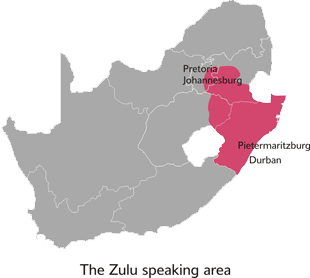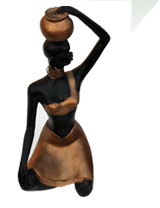Zulu:
|
 |
||||||||||
The Zulu language or isiZulu takes its name from a clan founded in the 16th century and which King Shaka raised to prominence in the early 19th century. The IsiZulu language is spoken as a home language by more than ten million people and as a second language by approximately 16 million people in South Africa. There is mutual intelligibility of the languages belonging to the Nguni group, which Zulu forms part of. As such, a Zulu person would, for instance, understand SiSwati and isiXhosa and a Swazi and Xhosa person isiZulu. IsiZulu is understood by people from the Cape to Zimbabwe.
Zulu is spoken predominantly in KwaZulu-Natal, but also in Mpumalanga, Gauteng (especially Johannesburg) and the northern parts of the Free State.
Zulu has a number of dialects, four of which are generally recognized as the major dialects: Zulu (of traditional Zululand), Zulu (of the old Natal), Lala and Qwabe. There are many regional variants of Zulu: the Central KwaZulu variety, the KwaZulu Coast variety, the Natal Coast variety, the Lower Natal Coast variety, the South West Natal variety, the Northern Natal variety, the Northern-Swati Border variety, the Natal-Eastern Cape Border variety and some urban varieties. There is also a Zulu based pidgin, known as Fanakalo (and by a host of other references), with a mixture of English, Afrikaans, Zulu, and other African language vocabulary material, which is used as a lingua franca among especially the mine workers.
The Zulu language has assimilated many sounds from the San and Khoi languages. The wealth of Khoisan words and sounds bear witness to the early contact including intermarriage and a sharing of cultures between the Xhosa and Khoisan people. This sharing became evident in the Zulu language, especially in the click sounds.
Zulu, like all indigenous Southern African languages, was an oral language until contact with missionaries such as J W Colenso, S B Stone, H Callaway and Lewis Grant from Europe. They taught people basic writing skills in Zulu while spreading the word of God. The first written document in Zulu was a Bible translation that appeared in 1883.


